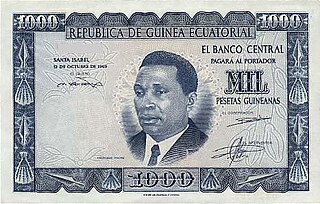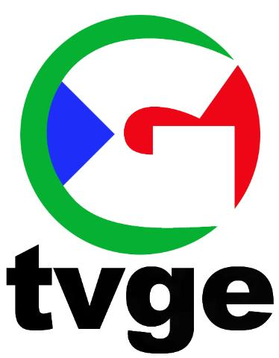
Equatorial Guinea, officially the Republic of Equatorial Guinea, is a country on the west coast of Central Africa, with an area of 28,000 square kilometres (11,000 sq mi). Formerly the colony of Spanish Guinea, its post-independence name refers to its location near both the Equator and in the African region of Guinea. As of 2021, the country had a population of 1,468,777, over 85% of whom are members of the Fang people, the country's dominant ethnic group. The Bubi people, indigenous to Bioko, are the second largest group at approximately 6.5% of the population.

The peseta was the currency of Spain between 1868 and 2002. Along with the French franc, it was also a de facto currency used in Andorra.
This gallery of sovereign state flags shows the national or state flags of sovereign states that appear on the list of sovereign states. For flags of other entities, please see gallery of flags of dependent territories. Each flag is depicted as if the flagpole is positioned on the left of the flag, except for those of the Islamic Emirate of Afghanistan, Iran, Iraq, and Saudi Arabia, which are depicted with the hoist to the right.
"Caminemos pisando las sendas de nuestra inmensa felicidad", sometimes written with la senda ) is the national anthem of Equatorial Guinea.
The ekwele or ekuele was the currency of Equatorial Guinea between 1975 and 1985. Although nominally divided into 100 céntimos, no subdivisions were issued. The name ekuele was used until 1979, whilst ekwele was used after. The renaming of the currency to "ekwele" from "peseta" was motivated largely by a sweeping Africanization program meant to rid the country of its colonial past by removing Spanish names and references from the public domain; the ekpele was a pre-colonial iron currency used by the Fang and Beti people.

The peseta was the currency of Equatorial Guinea from 1969 to 1975. It replaced the Spanish peseta at par shortly after gaining independence from Spain the prior year and was later replaced, again at par, by the ekwele.

The céntimo or cêntimo was a currency unit of Spain, Portugal and their former colonies. The word derived from the Latin centimus meaning "hundredth part". The main Spanish currency, before the euro, was the peseta which was divided into 100 céntimos. In Portugal it was the real and later the escudo, until it was also replaced by the euro. In the European community cent is the official name for one hundredth of a euro. However, both céntimo and cêntimo are commonly used to describe the euro cent.
Radio Nacional (Spanish) or Rádio Nacional (Portuguese), both meaning National Radio, may refer to:
The Ibero-American Summit, formally the Ibero-American Conference of Heads of State and Governments, is a yearly meeting of the heads of government and state of the Spanish- and Portuguese-speaking nations of Europe and the Americas, as members of the Organization of Ibero-American States. The permanent secretariat in preparation of the summits is the Ibero-American General Secretariat (SEGIB).

The Extremadura autonomous football team is the regional football team for Extremadura, Spain. It is not affiliated with FIFA or UEFA, because it is represented internationally by the Spain national football team. It plays only friendly matches. The creation of an Extremadura national team was promoted by César Sánchez, with the support of the Extremaduran Football Federation.

Atanasio Ndongo Miyone was an Equatoguinean musician, writer and Fang political figure. He wrote the lyrics to Equatorial Guinea's national anthem, Caminemos pisando las sendas de nuestra inmensa felicidad. He was executed in 1969 following a failed coup to depose Francisco Macías Nguema, the first ruler of an independent Equatorial Guinea.
The Sahrawi peseta is the currency of the partially recognized Sahrawi Arab Democratic Republic. It is divided in 100 céntimos, although coins with this denomination have never been minted, nor have banknotes been printed.

Equatorial Guinea–Spain relations are the diplomatic relations between Equatorial Guinea and Spain. Both nations are members of the Association of Academies of the Spanish Language, Organization of Ibero-American States and the United Nations.

Televisión de Guinea Ecuatorial is an Equatorial Guinean state television channel, which is part of the public media system called Radio Televisión de Guinea Ecuatorial (RTVGE).
This page is based on this
Wikipedia article Text is available under the
CC BY-SA 4.0 license; additional terms may apply.
Images, videos and audio are available under their respective licenses.







